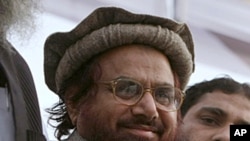The United States is offering a bounty of up to $10 million for the Pakistani man accused of masterminding the deadly 2008 terrorist attacks in Mumbai.
The State Department's "Rewards for Justice" website on late Monday announced the reward for information leading to Hafiz Mohammad Saeed's capture and conviction. The reward is the second highest bounty offered by the U.S.
Saeed is the founding member of the Pakistani-based militant group Lashkar-e-Taiba, which is suspected of carrying out several terrorist attacks on Indian soil. He currently heads the Jamaat-ud-Dawa charity which is largely seen as a front for the militant group.
| Top U.S. Rewards for Justice Bounties |
|
Saeed told reporters Tuesday that the U.S. issued the bounty because he is urging Pakistan not to reopen its border with Afghanistan to NATO supply convoys. The cleric demanded that Washington put forward any evidence of his involvement in terrorist activities. He later told the Pakistani GEO television that the the U.S. wants to silence him and discourage the public from supporting him. Saeed also called for the U.S. to leave Afghanistan and the region.
Pakistani authorities held Saeed under house arrest for about six months after the Mumbai attacks. He later was released, without charge. Pakistan’s Supreme Court said there was insufficient evidence to detain him.
The November 2008 terrorist attack on India's financial hub, carried out by Lashkar-e-Taiba, killed 166 people, including six Americans.
In Washington, U.S. State Department spokeswoman Victoria Nuland told reporters Tuesday the bounty on Saeed is about "justice being done" and that there should be no impunity for those who kill Americans overseas. She emphasized that the reward was not just for information leading to Saeed's arrest, but also for information leading to his conviction.
Pakistan's government did not officially comment Tuesday on the bounty. But a key member of the ruling coalition, Mushahid Hussain, rejected the U.S. decision and told VOA it could undermine the ongoing parliamentary review of Islamabad's ties with Washington.
"This will not go down well with the people of Pakistan. And as I said, it is politically motivated because in the past the U.S. had put some [Afghan] Taliban leaders on the list of terrorists and now those same Taliban leaders have been de-notified for political reasons because the U.S. is now negotiating with the Taliban for an exit from Afghanistan," said Hussain. "So putting somebody on the list or removing somebody from the list has nothing to do with the action of that person alleged or otherwise, but it is based on politics and pragmatism, and this seems to be the case of Hafiz Saeed also."
India has long accused Lashkar-e-Taiba of carrying out the attack, with the help of Pakistan's military and spy agency.
Watch related video
India's Minister of External Affairs S.M. Krishna said the U.S. move reflects the commitment of India and the U.S. to bringing the perpetrators of the Mumbai attack to justice.
"It also sends a strong message to the Lashkar-e-Taiba, and also its members and patrons, that the international community remains united in combating terrorism," said Krishna.
Krishna also said India would be "quite comfortable" if the U.S. "proceeds to act on Hafiz Saeed," who is one of India's most wanted fugitives.
Saeed is a prominent cleric in Pakistan, often appearing on TV shows and giving public speeches during rallies. While Lashkar-e-Taiba is officially banned in Pakistan, some analysts say Islamabad has done little to crack down on its activities.
Pakistani defense analyst Lieutenant General Talat Masood says that with the bounty, the U.S. wants to put pressure on Pakistan because of Saeed's opposition to the NATO supply route through Pakistan. Masood also said Saeed's Jamaat-ud-Dawa charity is "an embarrassment to Pakistan."
U.S. officials also have announced a $2 million bounty for the group's deputy leader, Hafiz Abdul Rahman Makki.
Lashkar-e-Taiba is officially designated as a foreign terrorist organization by the United States.











